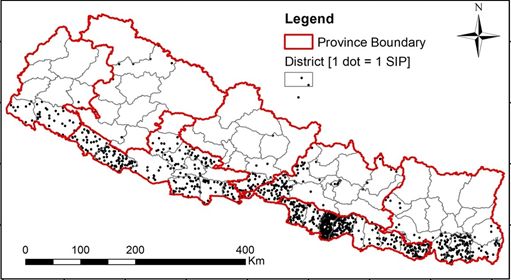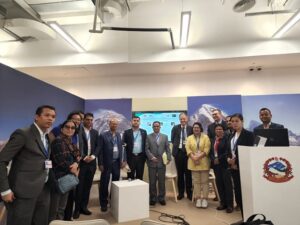
AEPC financed solar irrigation pumps in Nepal
The Government of Nepal (GoN) has been supporting the promotion and development of Renewable Energy Technologies (RETs). To date, Nepal has approximately 1,600 SIPs, 75% of which have been financed and installed by AEPC, and the remainder by a number of NGOs and INGOs such as IDE, ICIMOD, Winrock, and Practical Action.
Until the start of the 13th Plan (2013-2016), the use of solar energy for irrigation and drinking water was limited to hilly and remote areas. The 13th Plan incorporated ideas for solar energy for irrigation in the Terai. In the 2018-19 budget, the central government allocated NPR 350 million (~USD 3.5 million) as grants for SIPs and pledged additional support to renewable energy production if initiated by cooperatives and local communities in collaboration with the local government.
The 14th Plan also initiated a subsidy for solar drinking water and irrigation systems at the individual, community, and institutional (i.e., private sector) levels. The AEPC—our main partner in SoLAR project, is the main institution responsible for the implementation of the Renewable Energy Subsidy Policy, 2016.
In addition to the AEPC, a number of government organizations are working to promote and implement SIP projects in Nepal. The majority of solar projects have been implemented in provinces 2, 3, and 4. The private sector plays a very important role in Nepal, given that the subsidy delivery modality is driven by the private sector.
| Updates |
Climate resilience and sustainable water management: IWMI Nepal’s active engagement at COP28

Speakers at the COP28 side event spoke about comprehensive strategies for South Asia to prepare for emerging climate risks
IWMI Nepal’s active involvement at COP 28, led by Dr. Manohara Khadka, Country Representative of IWMI Nepal, made significant contributions to the discourse on climate resilience and sustainable water management. The side events held on the 9th and 10th of December brought together experts, policymakers, and stakeholders to explore the intricate interplay of water, energy, food, and ecosystems in addressing the challenges posed by climate change in South Asia. As a panelist in another four side-events, Khadka shared IWMI’s research experience and knowledge about interconnected links between water and climate change, and the role of water in climate change adaptation and mitigation. Speakers at the COP28 side event spoke about comprehensive strategies for South Asia to prepare for emerging climate risks
SoLAR Grid-connected SIP pilot presented in Asia Sector-specific Meet: Agriculture and Food Security
Shisher Shrestha made a virtual presentation in the Asia Sector-specific Meet (Sustainable Agriculture and Food Security) on March 31, 2023. Titled Opportunities and Challenges for Grid-connected Solar Irrigation in Nepal – Lessons from SoLAR Pilot Project, he highlighted the emissions due to diesel irrigation pumps and mentioned the findings that say that diesel pump consumes 13,870 m3 (kl). Shrestha presented the summary of findings from the impact evaluation studies conducted as part of the SoLAR-SA project. The evaluation study found that the impacts were mostly positive for SIP farmers since there was a strong reduction in the use of diesel pumps for SIP farmers compared to non-SIP farmers; SIP owners tend to devote more land to vegetables and SIP farmers earn 10% more revenue compared to non-SIP farmers. The presentation focussed on opportunities that exist for grid-connected Solar irrigation – a) reduces e-waste by utilizing out-of-warranty and abandoned systems b) is a dual source of clean energy for improved irrigation for farmers c) improved Capacity Utilization of SIPs d) potential to increase energy consumption in the agriculture sector for NEA d) localized generation from Solar will improve the grid voltage, reduce strain on the grid’s infrastructure and minimize transmission loss. The hurdles for implementing the grid-connected solar irrigation pilot were identified so the implementation process is not clear; and, there is a lack of policy for grid-connected solar irrigation, hence, awareness and capacity-building is needed at the local level (LG and NEA), etc. Also, no clear-cut direction on who should lead the implementation of grid-connected SIP projects – NEA, AEPC, Local government or the Farmer User Group – is there.
Innovation Fund Grantee Workshop and Coordination for Micro-Grid Pilot
Between the 20th and 23rd of February, a three-member team from SoLAR –Nepal travelled to Chitwan and Parsa to monitor a workshop held by Ghampower, a SoLAR IF grantee, in Chitwan and to coordinate procurement and implementation of the micro-grid pilot with Nepal Electricity Authority, Pokhariya. Mr Zarrif Hussen, an ex-official of APEC..
The Director of the Alternative Energy Promotion Centre (AEPC), Nepal deliberates on recommendations by IWMI
The Executive Director of the Alternative Energy Promotion Centre (AEPC), Mr Madhusudhan Adhikari, convened a meeting, with researchers..
Training of Technicians on Solar Water Pumping Systems – Nepal
In order to improve the technical knowledge and capacity of local technicians and engineers on solar water pumping systems, Pathibhara..
The IWMI-Nepal team visits two Municipalities to select sites for the SIP micro-grid connection pilot
The predominant model in Nepal is stand-alone off-grid solar irrigation pumps (SIPs). These SIPs reduce the use of dirty diesel fuel to a large extent..
Feasibility Studies Prove Chhipaharmai Rural Municipality As Potential Pilot Site
As the country slowly opened up after a disturbing second wave of the Covid-19 pandemic, IWMI conducted a survey at two sites in Nepal Tarai..
IWMI Nepal Conducts Field Visits to Explore GESI Impact of SIPs
IWMI Nepal researchers conducted a 6-day field trip to explore the GESI (Gender Equality and Social Inclusion) impact of SIP models from November 12-17, 2021.
SIP Training Imparted to Technicians in Saptari and Rautahat
With the rising popularity of Solar Irrigation Pumps (SIPs) among farmers, the installations of the same have been gaining momentum over the years.
Letter of Intent Signed between 4 Parties in Nepal
A Letter of Intent (LoI) has been signed between Chhipaharmai Rural Municipality, Nepal Electricity Authority (NEA), Alternative Energy Promotion Center (AEPC) and International Water Management Institute (IWMI) to support the SoLAR project in Nepal.
Shisher Shrestha (Country Lead- Nepal)
National Researcher- Renewable Energy, Water & Climate Change
s.shrestha@cgiar.org

